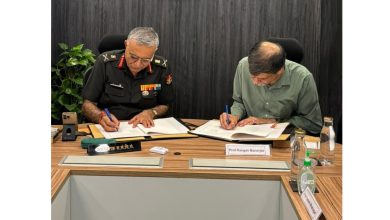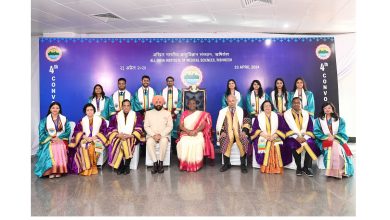Biocon Foundation releases second edition of consensus guidelines for head and neck cancer

The Oral Potentially Malignant Disorders (OPMD) Atlas Project aims to evaluate and accurately deploy point-of-care (PoC) diagnosis systems in the national healthcare system to enable accurate screening, detection and prognosis of OPMD patients
Biocon Foundation, the Corporate Social Responsibility (CSR) arm of the Biocon Group, held its annual Oral Cancer Task Force Conference in Bengaluru. The second edition of the India-specific Consensus Guidelines for the Management of Head and Neck Cancer (HNC), developed by the Oral Cancer Task Force (OCTF) was released to commemorate World Head and Neck Cancer Day. The updated India-specific guidelines will help oncologists improve the treatment outcomes of HNC patients by following evidence-based clinical practice. This is being published in the Journal of Cancer Research Statistics and Treatment.
Biocon Foundation has been conducting oral cancer screenings for underserved communities since 2011. In 2018, Biocon Foundation took the initiative for the formation of the OCTF with a mission to ideate, educate and engage stakeholders and thereby, effectively downstage oral cancer in India. The OCTF is an independent multi-disciplinary task force comprising leading specialists. Under the aegis of OCTF, the first ever Indian clinical practice guidelines on the management of head & neck cancer (HNC) were laid down and published in the Indian Journal of Cancer in February 2020.
Every year, 225,419 new HNC cases and 125,244 deaths from the disease are reported in India, according to GLOBOCAN 2020 report.
The launch took place at the 4th edition of the Oral Cancer Task Force (OCTF) Conference, at Taj Bangalore, in the presence of the Chief Guest Prof Govindan Rangarajan, Director IISc, Bengaluru; Kiran Mazumdar-Shaw, Founder & Managing Trustee, Biocon Foundation; Anupama Shetty, Mission Director, Biocon Foundation; Dr Govind Babu, Senior Oncologist, HCG; Dr Vijay Chandru, Chairman, Strand Life Sciences, Bengaluru; Dr Kumar Prabhash, Head of Medical Oncology at Tata Memorial Hospital; Dr Moni Abraham Kuriakose, Co-Founder, MD & CEO, Karkinos Healthcare & Consultant, Mazumdar-Shaw Cancer Center; Dr G K Rath, Former Chief, DBRA Institute Rotary Cancer Hospital & Former Head – NCI & Professor, AIIMS Delhi; Dr Pankaj Chaturvedi, Head & Neck Cancer Surgeon, Tata Memorial Hospital; among others.
Dr Praveen Birur, principal investigator for the study titled ‘Oral Potentially Malignant Lesion Atlas Project: Validating the Efficacy of a Novel, Point-of-Care Diagnostics and Developing an Integrated Multidimensional, Prognostic Nomogram,’ said the unique Oral Potentially Malignant Disorders (OPMD) Atlas Project will lead to the creation of a first-of-its-kind, multidimensional data-centric platform for the prevention, early detection, and treatment of oral cancer.
The OPMD Atlas Project aims to evaluate and accurately deploy point-of-care (PoC) diagnosis systems in the national healthcare system to enable accurate screening, detection and prognosis of OPMD patients. This will be a key advance in the war against oral cancer as oral potentially malignant disorders (OPMD) are the precursors of over 80 per cent of oral cancers.
The research project, which is funded by a Central government grant, is an outcome of the collaboration amongst four eminent institutes, namely, Mazumdar-Shaw Medical Foundation, the Indian Institute of Science, Bengaluru, KLE Society’s Institute of Dental Sciences, Bengaluru, the Department of Preventive Oncology, NCI-AIIMS – Jhajjar, and the Homi Bhabha Cancer Hospital, Varanasi, catalysed by Biocon Foundation.
The project will leverage advances in data science and Artificial Intelligence to combine datasets, including clinical information, lesion image, cytology, pathology, genomics and proteomics, and result in a first-of-its-kind, multidimensional data-centric platform. This platform will not only provide insights into better oral cancer diagnosis and management but also lead to the development of pragmatic and reliable approaches for the diagnosis and surveillance of patients with OPMD.
Kiran Mazumdar-Shaw, Founder and Managing Trustee, Biocon Foundation, said, “Biocon Foundation’s intervention in the area of cancer started with oral cancer screening using technology that enabled early detection and prevention. Today, the Foundation has catalyzed the coming together of four institutes of national eminence to roll out a ‘first of its kind’ research project funded by a central government grant. I believe the Oral Potentially Malignant Disorders (OPMD) Atlas project will help in developing a cost-effective and sustainable national oral cancer control program in India.”
Dr GK Rath, Former Chief, DBRA Institute Rotary Cancer Hospital & Former Head – NCI & Professor, AIIMS Delhi, said, “Oral Cancer is ranked the 13th most common cancer worldwide. India has an estimated 1,35,929 annual incidence of lip and oral cavity cancer with a mortality rate of 75,290. The early stages of oral cancer and Oral Potentially Malignant Disorders (OPMD) manifest themselves in varied forms making them difficult to detect. Irrespective of the stage at the time of presentation, a conventional oral examination followed by a tissue biopsy is considered the gold standard. As biopsy is invasive and not feasible in a limited resource setting, recent technology-aided oral cancer screening has proven to be efficient and has upscaled community-based screening on a large scale. OPMDs and oral cancers are preventable & curable through early diagnosis and intervention.”
Dr Moni Abraham Kuriakose, Co-Founder, MD and CEO, Karkinos Healthcare & Consultant, Mazumdar Shaw Medical Center, said, “India accounts for over one-third of the global burden of oral cancer, with an annual increase in the rate of 7.5 per cent. Majority of the oral cancers in India develop from pre-cancer lesions, which is highly variable in the cancer development potential ranging from 5 per cent to 40 per cent. Current strategies for identifying markers of progression using individual assays have not proved effective. With the advances in data science and Artificial Intelligence algorithms, it is feasible to combine multidimensional datasets including clinical information, lesion image, cytology, pathology, genomics and proteomics to come up with a unified & integrated analytical pipeline. The ICMR-funded oral precancer atlas project proposes to do this. Other investigators and startups will have access to this database and can decipher newer insights into oral cancer development and prevention. Only a country such as India with a large oral cancer disease burden and experienced investigators from diverse backgrounds can undertake such an ambitious project.”
Dr Anupama Shetty, Mission Director, Biocon Foundation, said, “Our work is fuelled by a profound sense of responsibility to the communities we serve. In the journey towards downstaging the burden of oral cancer, we have been screening underserved populations across seven states in India, through institutional partnerships and by developing affordable and appropriate technology for the early detection of oral cancer. Our goal is to empower Frontline Health Care providers with simple, automated, point-of-care (PoC) devices for enabling early diagnosis. The updated consensus guidelines released today are specific to the Indian subcontinent’s demographic and economic conditions, and will help us fight oral cancer more effectively.”
The conference provided an engaging platform for leading experts, researchers, and organisations to share their insights, advancements, and best practices in the field of oral cancer prevention, diagnosis, and treatment.




